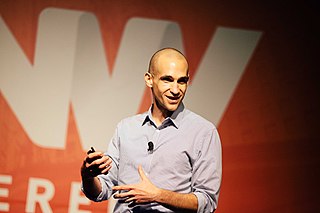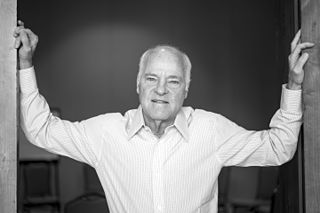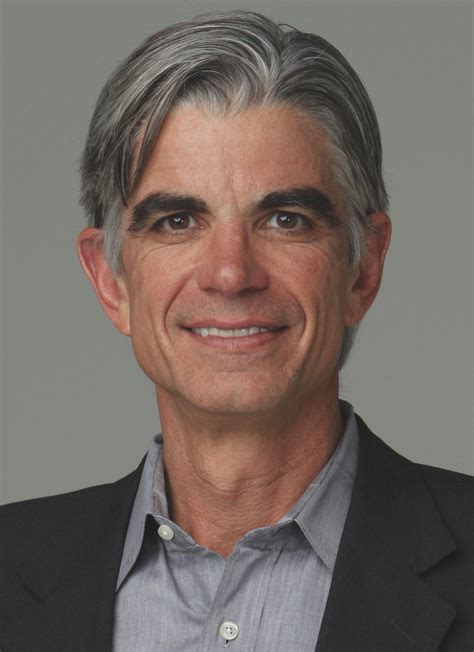Top 1200 Products Quotes & Sayings - Page 3
Explore popular Products quotes.
Last updated on December 4, 2024.
One thing people underestimate is how markets don't allow anyone to do anything except make better and better products. There's not much leeway. The world is a lot more competitive than most people think, particularly in a high-technology area. If a company takes its eye off improving its products, if it tries to do anything that would be viewed as an exercise of power, it'll be displaced very rapidly.
...Only the big food manufacturers have the wherewithal to secure FDA-approved health claims for their products and then trumpet them to the world. Generally, it is the products of modern food science that make the boldest health claims, and these are often founded on incomplete and often bad science.
Television screens saturated with commercials promote the utopian and childish idea that all problems have fast, simple, and technological solutions. You must banish from your mind the naive but commonplace notion that commercials are about products. They are about products in the same sense that the story of Jonah is about the anatomy of whales.
Our goal is to desperately make the best products we can. We're not naive. We trust that if we're successful and we make good products, that people will like them. And we trust that if people like them, they'll buy them. And we figured out the operation and we're effective. We know what we're doing, so we'll make money, but it's a consequence.
Entrepreneurship is all about an idea that creates differentiated business value to one's customers. You must be able to convince your customers about the benefits that association with you or your products will give them. People are ready to pay if they are convinced about your services or products.
The passive American consumer, sitting down to a meal of pre-prepared food, confronts inert, anonymous substances that have been processed, dyed, breaded, sauced, gravied, ground, pulped, strained, blended, prettified, and sanitized beyond resemblance to any part of any creature that ever lived. The products of nature and agriculture have been made, to all appearances, the products of industry. Both eater and eaten are thus in exile from biological reality.
We wield an enormous influence over the world through how we choose to vote and what we choose to buy. Again, it's the power of numbers. If voters hold their leaders responsible for doing something about global warming, it will get done. If most people refuse to buy products from companies that, for example, wrap products in more plastic than necessary, pretty soon the plastic wrapping will stop.
When you come from a privileged household, we've been able to buy monthly feminine products since the first day that we got our periods. A lot of women out there have absolutely no means to be able to afford something that seems as simple and as much of a no-brainer as a feminine product. I think Monthly Gift has a really brilliant cause - giving underprivileged girls free feminine products every month.
Every year tens of thousands of animals suffer and die in laboratory tests of cosmetics and household products...despite the fact that the test results do not help prevent or treat accidental or purposeful misuse of the products. Please join me in using your voice for those whose cries are forever sealed behind the laboratory doors.
Even as the government dominates the headlines, private entrepreneurs are busy every day working to improve products and services that improve our lives. They do it without taxing us or regulating us, or making us suffer through tedious elections or political debates. They make their products and offer them to us in a way that pleases the consuming public the most. We can choose whether we want them or not.
I understand and respect people who say they want to boycott the Trump brand. I also respect your right to buy his products. But what you miss is that no one in public office, Hilary or Trump should use that platform to profit themselves. In Trump's case there are serious concerns about the conflict of interest in his brand and business ownership. Do we really want a president who had products he can push while working for the American people?
We are the most focused company that I know of or have read of or have any knowledge of. We say no to good ideas every day. We say no to great ideas in order to keep the amount of things we focus on very small in number so that we can put enormous energy behind the ones we do choose.....It's not just saying yes to the right products, it's saying no to many products that are good ideas, but just not nearly as good as the other ones.
So it is always preferable to discuss the matter of veganism in a non-judgemental way. Remember that to most people, eating flesh or dairy and using animal products such as leather, wool, and silk, is as normal as breathing air or drinking water. A person who consumes dairy or uses animal products is not necessarily or usually what a recent and unpopular American president labelled an "evil doer.
Green consumerism generally, and 'healthy' products and lifestyles in particular, contain quite precise notions about how an individual should consider his or her well-being. Not only is the market-place celebrated but an understanding of the 'natural body' itself becomes fetishised and idolised. Normality seems to have wholly dispensed with bodily illness and pain. Perfection is the norm, and one that can be gained through acquiring the correct products and perfecting the body.
80% of all products and services that will be on the market in five years do not exist today. So therefore, always be innovative, always be creative, always think, 'What new products or services could I create, could I represent, could I joint venture?" Sometimes you can find someone else that has a fabulous product or service that you can use your existing business or resources to sell and you can double your income or sales in your business by selling somebody else's product to the same customers that are buying yours.
When the functionality of a product or service overshoots what customers can use, it changes the way companies have to compete. When the product isn't yet good enough, the way you compete is by making better products. In order to make better products, the architecture of the product has to be interdependent and proprietary in character.
The sheer novelty and glamor of the Western diet, with its seventeen thousand new food products every year and the marketing power - thirty-two billion dollars a year - used to sell us those products, has overwhelmed the force of tradition and left us where we now find ourselves: relying on science and journalism and government and marketing to help us decide what to eat.
We use similar products. Our focus industry is healthcare and hospitality. But we haven?t done anything interactive. The first day full of seminars is full of things I thought would be useful: quick service restaurant and mobile phone applications. Businesses are providing more services and products by self-service means.
It may be thought justifiable to require tests on animals of potentially life-saving drugs, but the same kinds of tests are used for products like cosmetics, food coloring, and floor polishes. Should thousands of animals suffer so that a new kind of lipstick or floor wax can be put on the market? Don't we already have an excess of most of these products? Who benefits from their introduction, except the companies that hope to profit from them?
I think, for young people, and I think, for women, it's great to work in new products and derivatives products because, if you work in a plain-vanilla product, it's going to take you decades to get to a level where other people are. If you work in a brand new business, no one is more experienced than you are.
Apple was very close to bankruptcy and to irrelevance [but] you learn a lot about life through death, and I learnt a lot about vital corporations by experiencing a non-vital corporation. You would have thought that, when what stands between you and bankruptcy is some money, your focus would be on making some money, but that was not [Steve Jobs’] preoccupation. His observation was that the products weren’t good enough and his resolve was, we need to make better products. That stood in stark contrast to the previous attempts to turn the company around.
We've got a portfolio of companies that range all the way from hotels to television stations and cable TV companies, oil and gas, consumer products, and industrial products. If there's anything that I want to know more about, I have the opportunity. It's right in our portfolio. I can spend time at the factory or with the manangement and learn as much as I want. You can't get bored doing that.
Part of America's industrial problems is the aim of its corporate managers. Most American executives think they are in the business to make money, rather than products or service. The Japanese corporate credo, on the other hand, is that a company should become the world's most efficient provider of whatever product and service it offers. Once it becomes the world leader and continues to offer good products, profits follow.
Endless data show that diverse teams make better decisions. We are building products that people with very diverse backgrounds use, and I think we all want our company makeup to reflect the makeup of the people who use our products. That's not true of any industry really, and we have a long way to go.
Just in the past couple of years, there's been pushback against some of that marketing, as parents have gotten really upset. Now we're seeing Coke and Pepsi kind of shape-shifting. Instead of doing these very explicit marketing deals, they are getting into schools in much more hidden ways - things like My Coke Rewards, where they encourage schools to push their student body to purchase Coke products, in exchange for points that go toward various products for the school. It's a way for these companies to get in front of kids, presented as a form of charity.
To her credit, Madam Walker discerned that black women wanted to conform to white Victorian models of beauty. She was aware of the double- sidedness of her products - helping black women appear more European in look, with straight hair - but she always maintained that she was simply selling products that promoted hair growth.
We see a lot of feature-driven product design in which the cost of features is not properly accounted. Features can have a negative value to customers because they make the products more difficult to understand and use. We are finding that people like products that just work. It turns out that designs that just work are much harder to produce that designs that assemble long lists of features.
The growing complexity of science, technology, and organization does not imply either a growing knowledge or a growing need for knowledge in the general population. On the contrary, the increasingly complex processes tend to lead to increasingly simple and easily understood products. The genius of mass production is precisely in its making more products more accessible, both economically and intellectually to more people.
Do you think that we're products of our environments? I think so, or maybe products of our expectations. Others' expectations of us or our expectations. I mean others' expectations that you take on as your own. I realize how difficult it is to seperate the two. The expectations that others place on us help us form our expectations of ourselves.
There are a lot of products still to be discovered in the world and experimentation, for example with seafood and fish. There are thousands of products that we're not eating right now that maybe will be cultivated in a good agriculture situation, a sustainable, ecological way. Maybe there will be textures or flavors we hadn't even thought of. In the Amazon there are 400 fruits that are not cultivated right now. They're just incredible fruits. Textures, tastes that we don't know right now.
To the economically illiterate, if some company makes a million dollars in profit, this means that their products cost a million dollars more than they would have without profits. It never occurs to such people that these products might cost several million dollars more without the incentives to be efficient created by the prospect of profits.
When I started making enough money to afford high-end, fancy skincare products with sexy bottles and impressive claims, I decided to give them a try. As a result my skin acted up and got irritated. I think sometimes women may be overcleansing their skin. Some products and masks can be too aggressive and irritating for certain skin types. I believe the more simple, natural, and easy the skin care regime, the better off your skin will be.
People, materials, facilities, money, and time are the resources available to us for conducting our business. By applying our skills, we turn these resources into useful products and services. If we do a good job, customers pay us more for our products than the sum of our costs in producing and distributing them. This difference, our profit, represents the value we add to the resources we utilize.
I think there's a big difference between the impact of trade agreements on corporate America and the impact on Mr. and Mrs. America. Corporate America has adjusted to them by investing lots of capital offshore... What we're doing is we're exporting jobs and importing products instead of exporting products and keeping jobs.
Consumers will purchase high quality products even if they are expensive, or in other words, even if there are slightly reasonable discount offers, consumers will not purchase products unless they truly understand and are satisfied with the quality. Also, product appeal must be properly communicated to consumers, but advertisements that are pushed on consumers are gradually losing their effect, and we have to take the approach that encourages consumers to retrieve information at their own will.
We grow by letting the customer tell us. So when the customer tells us that they're frustrated, that they just got their catalogue and we're already out of a product they wanted, then it tells me that we're not making enough. We let the customer tell us instead of creating an artificial demand for our products. Any time you're making products that people don't need, you're at the mercy of the economy, you're at the mercy of whatever is going on. So we tried to avoid that situation.
The potential of a zero-risk is in every market, because eventually I think people will switch to these products as they become available. There are two unmet needs in smokers: something that is much better for my health and something that bothers others much less or doesn't bother them. These are things cigarettes can't resolve. These new products are developed to address these needs.
Being vegan truly is the secret to my life's joy and peace. I feel physically and spiritually better than I could have ever imagined knowing that I am doing everything I can to reduce animal suffering with simple lifestyle choices like being vegan, never wearing any products made from animals (like wool and leather), and buying only from companies that NEVER test their products or ingredients on animals.






















































